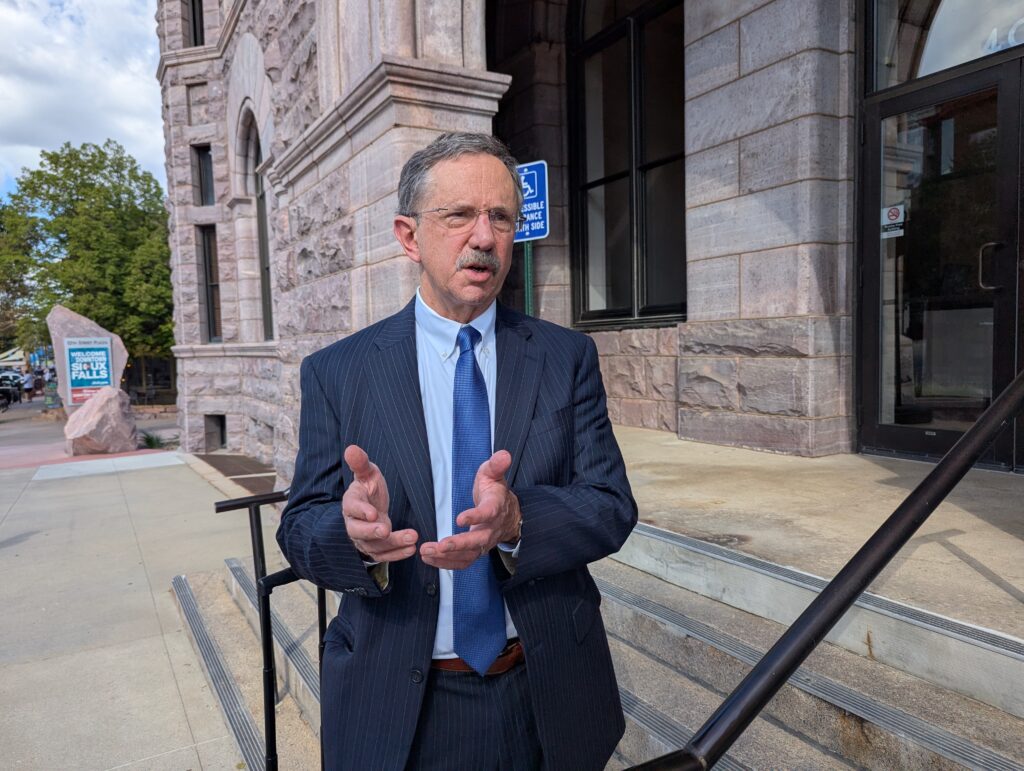Rapid City lawyer Jim Leach speaks to the media outside the federal courthouse in Sioux Falls after a hearing on Sept. 24, 2025, where he represented a University of South Dakota art professor suspended over a social media post about the killing of Charlie Kirk. (John Hult/South Dakota Searchlight)
SIOUX FALLS — More than 40 people showed up at a federal courthouse Wednesday for a hearing on the future of a University of South Dakota art professor suspended for a social media post about the killing of conservative commentator Charlie Kirk.
Speaking with that crowd surrounding him and U.S. District Judge Karen Schreier in front of him, Phillip Michael Hook’s lawyer said Hook ought to be immediately reinstated, and that the Board of Regents should not be allowed to proceed with a Monday disciplinary hearing that could end with his termination.
Some in the audience walked into the courthouse with Hook, with whom they’d been speaking outside the courthouse in downtown Sioux Falls shortly before the hearing. Rick Weiland, a Sioux Falls activist known for his campaigns for Medicaid expansion and other progressive ballot measures, was among those in attendance.
A public sector employee “doesn’t forfeit the right to free speech because they happen to be a public employee,” Rapid City lawyer Jim Leach said.
Kirk was killed Sept. 10. That same day, Hook wrote a Facebook post that used a derogatory term to describe Kirk and questioned the veracity of his supporters’ “concerns” about political violence. The Facebook page was his personal account, but noted his status as a USD professor. He deleted the post within three hours, Leach said.
SD university professor files lawsuit opposing termination for social media post about Charlie Kirk
South Dakota Speaker of the House Jon Hansen soon called for Hook’s dismissal, as did the Legislature’s Freedom Caucus. Republican Gov. Larry Rhoden said he was “shaking mad” about Hook’s post.
Hook was suspended on Sept. 12 and served a notice of his pending termination.
He was suspended because he angered powerful people in South Dakota with commentary on a “matter of public concern,” Leach said.
“Yet here, we have the government, at the highest level, punishing Professor Hook for his political speech,” he added, arguing that Speaker Hansen’s communications with USD President Sheila Gestring appeared to be all it took to set the wheels of termination in motion.
Court precedent says a public employee can be fired for speech, Leach said, but there must be evidence that the speech was disruptive to the employer. In Hook’s case, Leach said, there’s no evidence in the record — including in the termination notice — that it was.
Instead, he argued, the termination notice was an unconstitutional violation of Hook’s First Amendment rights and grounds for an immediate court order that would reinstate him and block the University of South Dakota from proceeding with its disciplinary action and barring retaliatory action.
Justin Bell, representing the Board of Regents, admitted there’s no evidence in the disciplinary or court record that Hook’s post was disruptive to the workplace. But Bell told Schreier that’s because the court record is barely more than 24 hours old. Hook filed his case on Tuesday.
Instead of immediately shutting down the Board of Regents, Bell argued, the judge should allow the case to proceed.
The post, Bell argued, generated “hundreds” of calls and emails to the school, and may have created disruption for students and faculty.
With comments “as insidious as Professor Hook’s, made in a capacity that mentions his status at the university, it’s reasonable to conclude that there’s going to be disruption” for his employer, Bell said.
To say Hook was fired because Speaker Hansen reached out to the school’s president, Bell said, downplays the impact the post had for the university in potentially alienating a yet-untallied number of students, alumni and faculty.
“All we know is that Speaker Hansen is one of the people who reached out,” Bell said.
The First Amendment, Bell argued, “does not protect speech of this nature.”
Judge Schreier said she would take the request for a temporary restraining order under advisement and issue a ruling in the coming days.
Get updates on developing stories like this: Sign up for our free newsletter.


